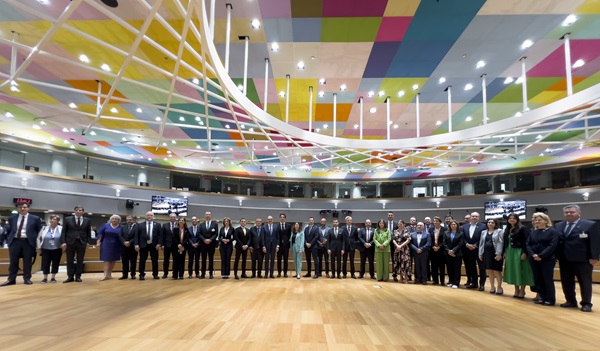 Credit: European Union
Credit: European Union
On Thursday 23 May 2024, Luxembourg’s Minister of the Economy, SMEs, Energy and Tourism, Lex Delles, participated in the space training Council in Brussels, on the sidelines of the European Union’s Competitiveness Council, which was dedicated to “strengthening Europe’s competitiveness through space”.
In addition to the Space Training Council, the Ministerial Council of the European Space Agency (ESA) took place on Wednesday 22 and Thursday 23 May 2024 as well as a joint informal EU-ESA ministerial meeting aimed at developing a coordinated European space policy, during which the conclusions of the Space Council were widely discussed, allowing national representatives to express their views on the actions to be taken aiming to act together for Europe, in an impactful and coherent manner.
According to Luxembourg’s Ministry of the Economy, a fragmented international context, with a European economy weakened by international geopolitical tensions, the sector, and in particular the European space programme and the ESA programmes, appear as essential tools for the development of competitiveness, autonomy and of Europe's leadership on the international scene.
If space contributes, and will contribute to the economic growth of Europe in general, the potential for development and diversification of the New Space ecosystem and commercial space is considerable, the Ministry of the Economy and Luxembourg’s Space Agency noted. An intrinsically innovative sector, bringing solutions and new market opportunities, space is an essential opportunity for Europe, they stressed.
Regarding the actions to be taken, consensus also reigned: a competitive space sector will contribute to European competitiveness. This development is conditioned by several elements, and in particular by the creation of synergies between the space sector and the “terrestrial” sectors, to transform the needs of terrestrial users into a growth catalyst for companies in the space sector.
The aspect of financing, in particular the securing, over time, of less risk-averse public and private investments, as well as adequate access of States to secure spatial data for effective implementation of public policies, were also addressed.
Finally, the conclusions highlighted the role of space in strengthening Europe on the international scene, an aspect which was also mentioned by the Director General of the European Space Agency, Joseph Aschbacher. He also insisted on the importance of a coordinated and coherent European space policy, and of an even more agile sector.
In his speech, Minister Delles declared: “We must strengthen the European space ecosystem, in particular by facilitating access to financing for our space industry, by simplifying administrative procedures for our SMEs, startups and scale-ups.” He also emphasised the importance of human capital and increased autonomy, both in terms of supplies, critical infrastructure and even access to space.
Discussions were also held about the future European space law, preliminary work on which began in 2023 for probable publication at the end of 2024.
In this context, Minister Delles insisted on the importance of such an initiative. He also brought to the attention of the Council the need to develop such a text in close collaboration with commercial players in the sector and to put in place initiatives allowing the emergence of innovative solutions to make this law a tool promoting the development of the European space industry while ensuring the safety, resilience and sustainability of activities in space.








